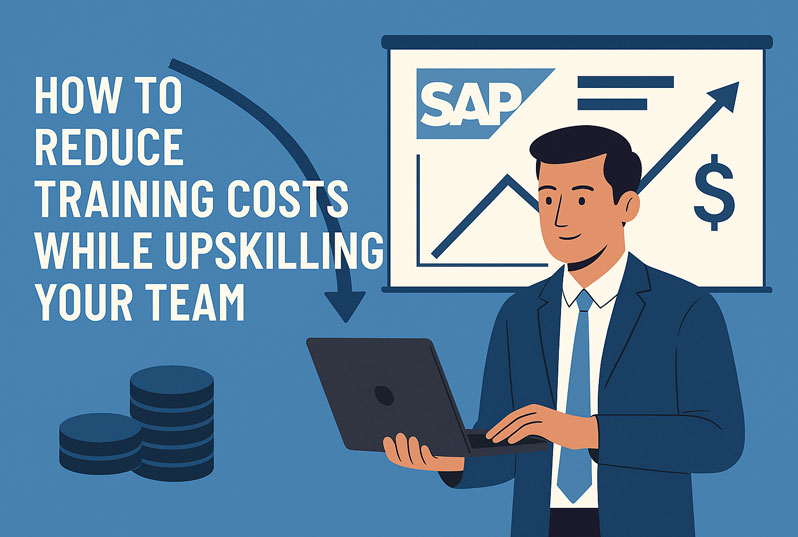Why SAP Training Is Essential for Business Growth & Digital Transformation
by Michael Management

SAP Adoption & Digital Transformation Trends
Digital transformation is reshaping how businesses operate, compete & serve customers. SAP, a global leader in enterprise resource planning (ERP) systems, plays a central role in this shift. Organizations adopting SAP are better positioned to streamline processes, unify data & support cloud-based innovation.
A 2023 IDC report found that 80% of companies with mature digital strategies rely on ERP platforms like SAP to drive operational efficiency. But technology alone isn’t enough—SAP training ensures employees can fully leverage these tools to meet strategic goals.
As SAP evolves into platforms like SAP S/4HANA, offering real-time analytics, AI integration & cloud scalability, the need for a skilled workforce grows. Effective SAP training equips employees to support this transformation.
What Is SAP Training?
SAP training helps individuals & organizations build proficiency with SAP tools. It’s critical for business users, IT staff & consultants aiming to use SAP effectively. Training options vary by learning style, career stage & business objective.
Common SAP Training Formats
- Online Courses: Self-paced programs on platforms like ours provide accessible options for foundational & advanced topics. A 2024 Forrester study reports a 25% increase in team productivity among companies using online SAP training.
- Simulation-Based Training: Realistic SAP environments allow learners to complete tasks in modules like SAP FICO or SAP MM without risk. These practice-based formats are common in instructor-led courses.
- Certification Programs: SAP certifications validate knowledge in modules like S/4HANA Cloud or Business One. According to a 2024 Lightcast report, SAP-certified professionals earn up to 30% more than non-certified peers.
Most organizations blend formats—broad online upskilling with focused certifications—to create comprehensive SAP learning paths.
Key Business Benefits of SAP Adoption
Adopting SAP delivers measurable benefits that enhance productivity, improve decision-making, and provide a competitive edge. These advantages stem from SAP’s ability to integrate business processes, leverage data, and enable agility in a digital-first world.
1. Increased Productivity
SAP systems automate workflows & reduce manual tasks. SAP S/4HANA’s simplified data models improve efficiency by as much as 25%, especially in industries like manufacturing & retail.
2. Better Decision-Making
Real-time analytics via SAP HANA allows leaders to track KPIs, respond quickly to change & make data-informed decisions. Swiss Port Ltd reduced costs by 30% after improving insight through SAP.
3. Competitive Advantage
By integrating with technologies like AI & IoT, SAP helps businesses innovate & scale. McKinsey reports that companies using advanced ERP systems are 1.5x more likely to see above-average revenue growth.
SAP training is essential for realizing these outcomes. Without it, teams underutilize features, miss opportunities & reduce ROI.
SAP’s Role in Digital Transformation
SAP supports digital transformation by enabling real-time access to data, standardizing processes & supporting cloud adoption.
- Real-Time Data: SAP’s in-memory computing, exemplified by SAP HANA, processes massive datasets in real time, eliminating the delays associated with traditional databases. This enables businesses to gain instant visibility into operations, from inventory levels to customer interactions. For instance, SAP S/4HANA’s embedded analytics allow companies to generate predictive insights, helping them anticipate demand and optimize resources. Real-time data is critical for responding to market shifts, as seen in industries like retail, where SAP’s CRM solutions enhance customer engagement through personalized experiences.
- Process Standardization: SAP centralizes and standardizes business processes, creating a single source of truth across departments. This reduces inefficiencies caused by fragmented systems and ensures consistency in operations. For example, SAP’s digital core integrates front-end and back-end processes, enabling seamless collaboration between sales, finance, and supply chain teams. Standardization also simplifies compliance with regulatory requirements, a key concern for global enterprises.
- Cloud Readiness: SAP’s cloud-based solutions, such as SAP S/4HANA Cloud and SAP Business One, offer scalability and flexibility, making them ideal for businesses transitioning to the cloud. These platforms support hybrid and multi-cloud strategies, allowing organizations to adapt to changing needs without significant infrastructure investments. A 2023 IDC study highlighted that cloud-ready ERP systems like SAP are a cornerstone of digital platforms, driving innovation through integration with technologies like IoT and AI.
SAP’s role in digital transformation is not just technological—it’s cultural. Successful adoption requires a workforce that understands how to leverage these capabilities, underscoring the importance of comprehensive training programs.
Real-World Results & Industry Examples
Real-world examples and statistics illustrate the tangible impact of SAP adoption and training:
- Case Study: Swiss Port Ltd: By implementing SAP S/4HANA, Swiss Port Ltd achieved a 30% reduction in total cost of ownership through streamlined processes and improved data management. The company’s investment in SAP training ensured employees could fully utilize the system, contributing to cost savings and strategic growth.
- Industry Stats: A 2024 Forrester Consulting study found that organizations using role-based SAP Training increased team productivity by up to 25%, with employees reporting higher satisfaction due to targeted learning solutions. Additionally, a 2023 SAP report noted that 425,000+ organizations worldwide rely on SAP solutions, generating £26 billion in revenue for the company, underscoring its dominance in the ERP market.
- Automotive Industry: The automotive sector, an early adopter of SAP, uses its solutions for customer service and retention. Personalization features in SAP’s CRM modules have improved driver experiences while providing valuable data for product development, giving companies a competitive edge.
These proof points highlight the measurable benefits of SAP when paired with effective training. Organizations that invest in upskilling their workforce are better positioned to realize the full potential of their SAP investment.
Challenges & Considerations
While SAP offers significant advantages, adoption is not without challenges. A 2024 ResearchGate review identified high implementation costs, complex integration, and usability issues as barriers, particularly for small and medium enterprises (SMEs). Comprehensive training mitigates these challenges by ensuring users can navigate the system effectively and align it with business needs. Organizations should also conduct cost-benefit analyses and phased implementations to maximize ROI, as recommended by industry experts.
Explore SAP Training Programs With Michael Management
The journey to digital transformation begins with a skilled workforce and the correct platforms for your business. SAP training equips employees with the tools to drive productivity, enhance decision-making, and maintain a competitive edge. Whether you’re a business leader seeking to upskill your team or an individual aiming to advance your career, now is the time to explore SAP training programs.
Sign up for a free corporate SAP training trial to discover our range of SAP training options, from online courses and simulations to certification programs tailored to your needs. With expert-led instruction and hands-on learning, MMC empowers learners to master SAP and contribute to their organization’s digital transformation. Start your SAP journey today and unlock the full potential of this transformative technology.
by Michael Management
More Blogs by Michael Management

SAP for Finance Teams: How CFOs Can Leverage SAP...
As SAP evolves in 2025 with S/4HANA’s cloud capabilities and...

How B2B Companies Can Future-Proof Their Workforce...
We are in an era when digital transformation is redefining every s...

SAP Training Best Practices for Large Enterprises...
Coordinating SAP training in a large enterprise is like leading a ...
Related Blogs

How Corporate SAP Training Improves Productivity &...
The Value of SAP Training for Your Organization SAP systems sup...

Amortization Tables Explained
Amortization tables are commonly used in the financial sector. They li...

How to Reduce Training Costs While Upskilling Your...
Implementing SAP is a major investment for any organization but without a...
.png)

